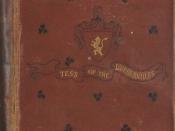"Character is fate", said the great German Romantic Novalis. How far is Tess' character responsible for her tragedy, and how far are other factors responsible for this undoing?
*
* *
Is there a meaning to our existence, a grand master overseeing our lives atop the stellar landscape, gazing down on each and everyone of us and orchestrating every event of this world together in a beautiful harmony of dissonance? Some of mankind's older guard would agree on this; today, with the rise of pure reasoning and logics, it is becoming increasingly difficult to believe in a single cosmic finality towards which everything converges. In this regard, Thomas Hardy can be seen as a contemporary, if not a precursor, 19th century British writer. In his acclaimed novel Tess of the d'Urbervilles, he skilfully manages to address many themes: a promotion for the end of social classes, the realistic depiction of a woman (as the sub-title "A Pure Woman" can be interpreted), and, one of the most widely spread an accepted of all readings, a show of the relative smallness and powerlessness of humans confronted to the tragic events and happenings which one may put together as being "fate": a prime example of cosmic irony.
In fact, cosmic irony is not present in Tess of the d'Urbervilles at all. There are three subjects which need thorough examination in order to fully understand the novel: what were Hardy's views concerning the question of Fate, the place given to irony, and the implication of Tess' character in her own fall.
Thomas Hardy first published Tess as weekly instalments in The Graphic in 1891. The text had been edited in order to be accepted for publication, and Hardy later rewrote certain parts which he had to soften before, making several versions before coming...



Well written
I agree with all you wrote. This is a very well written arguement. It seems that Tess' character was formend to have the fate it recieved.
1 out of 1 people found this comment useful.